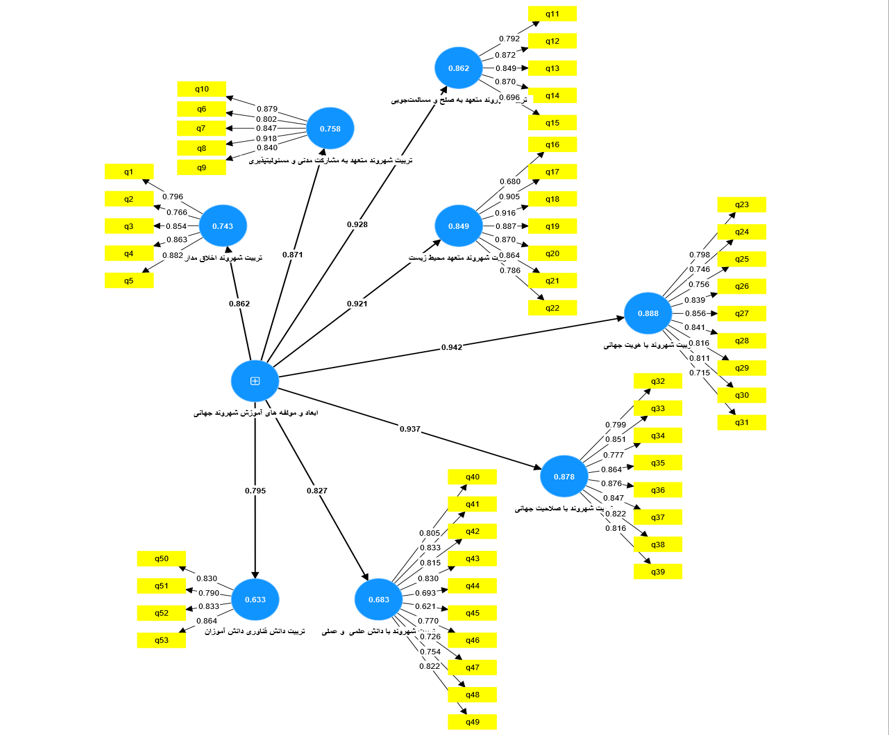شناسایی ابعاد و مولفههای آموزش شهروند جهانی در مدارس متوسطه سال اول با تکنیک تحلیل مضمون
کلمات کلیدی:
آموزش, شهر وند جهانی, آموزش شهروند جهانی, مدارس متوسطه اولچکیده
هدف اصلی این مقاله شناسایی ابعاد و مولفههای آموزش شهروند جهانی در مدارس متوسطه سال اول با تکنیک تحلیل مضمون است. روش انجام پژوهش آمیخته(کیفی-کمی) است. برای انجام این پژوهش علاوه بر مطالعۀ اسنادی، از تکنیک تحلیل مضمون با نرم افزار MAXQDA12، برای شناسایی عوامل و مؤلفهها استفاده شده است. جامعه آماری در این پژوهش تمام اعضای هیأت علمی با رتبه استادیاری و بالاتر در حوزه مدیریت آموزشی و مدیریت آموزش عالی و تکنولوژی آموزشی همچنین مدیران و معلمان مدارس متوسطه اول بودند که بعد از انجام 14 مصاحبه اشباع نظری صورت گرفت. در نهایت مضامین پایه، سازمان دهنده و فراگیر استخراج گردید و در بخش کمی برای تعیین میزان تاثیر و رتبه بندی ابعاد و مولفهها از روش معادلات ساختاری استفاده شده است. با توجه به مصاحبههای نیمه ساختار یافته، 8 بعد(تربیت شهروند اخلاق مدار، تربیت شهروند متعهد به مشارکت مدنی و مسئولیتپذیری، تربیت شهروند متعهد به صلح و مسالمتجویی، تربیت شهروند متعهد به محیط زیست،تربیت شهروند با هویت جهانی،تربیت شهروند با صلاحیت جهانی، تربیت شهروند با دانش علمی و عملی، تربیت دانش فناوری دانش آموزان) و 53 مولفه (مضامین سازمان دهنده) برای آموزش شهروند جهانی در مدارس متوسطه سال اول استخراج گردید. پس از آن با توجه به پرسشنامه محقق ساخته مشخص گردید که بُعد تربیت شهروند با هویت جهانی با ضریب 0.942، تربیت شهروند با صلاحیت جهانی با ضریب 0.937، تربیت شهروند متعهد به صلح و مسالمتجویی با ضریب 0.928، تربیت شهروند متعهد به محیط زیست با ضریب 0.921، تربیت شهروند متعهد به مشارکت مدنی و مسئولیتپذیری با ضریب 0.871، تربیت شهروند اخلاق مدار با ضریب 0.862، تربیت شهروند با دانش علمی و عملی با ضریب 0.827 و تربیت دانش فناوری دانش آموزان با ضریب 0.795 به ترتیب در اولویت اول تا هشتم قرار دارند.
دانلودها
مراجع
Zarei Z, Nikdel M. Content Analysis of Iranian Elementary Social Studies Textbooks (Second Level) in terms of
Attention to Global Citizen Features. Research in Social Studies Education. 2021;3(2):59-82.
Baker W, Fang F. 'So maybe I'ma global citizen': developing intercultural citizenship in English medium education.
Language, Culture and Curriculum. 2021;34(1):1-17. doi: 10.1080/07908318.2020.1748045.
Qaltash A, Salehi M, Mirzaei H. Content Analysis of Iranian Elementary Social Studies Curriculum in terms of
Attention to Global Citizen Features. Research in Curriculum Planning (Knowledge and Research in Educational Sciences -
Curriculum Planning). 2012;9(35):117-31.
Poursalim A, Arafi M, Fathi Vajargah K. Exploring Curriculum Elements for Global Citizenship Education in the
Elementary Level of Iran's Educational System: A Qualitative Study. Research in Curriculum Planning. 2019;16(60):36-54.
Coelho DP, Caramelo J, Menezes I. Global citizenship and the global citizen/consumer: Perspectives from
practitioners in development NGOs in Portugal. Education, Citizenship and Social Justice. 2021:216-37. doi:
1177/1746197921999639.
Tale-Pasand S, Keshavarz Y, Fatemi Nasab ZS. Validation of the Global Citizenship Attitude Scale among Students
at Semnan University. Research and Planning in Higher Education. 2017;23(4):97-120.
Rashidi Z. Globalization and the Necessity of Public Education for Global Citizenship Training. Higher Education
Letter. 2017;10(38):103-28.
Jafari S. Identification and Validation of Components for Global Citizenship Education According to Experts: A
Mixed-Method Study. Journal of Education and Learning Studies. 2019;11(2):153-74.
Booth J. Becoming a global citizen? Developing community-facing learning in the social sciences. Learning and
Teaching. 2021;14(1):60-88. doi: 10.3167/latiss.2021.140104.
Albanesi C, Prati G, Guarino A, Cicognani E. School citizenship education through YPAR: What works? A mixedmethods study in Italy. Journal of Adolescent Research. 2023;38(1):143-77. doi: 10.1177/07435584211035564.
Spero TA. Global citizenship education as bounded self-formation in contemporary higher education
internationalisation projects. Globalisation, Societies and Education. 2021:1-16. doi: 10.1080/14767724.2021.1896999.
Estellés M, Fischman GE. Who needs global citizenship education? A review of the literature on teacher education.
Journal of Teacher Education. 2021;72(2):223-36. doi: 10.1177/0022487120920254.
Aboagye E. 10 Global Citizenship Education: Institutional Journeys to Socially Engaged Students in Canada. Global
Citizenship Education: University of Toronto Press; 2021. p. 253-74.
Kafshchian Moghadam A, Maleki H, Sadeghi A. Designing a Citizenship Rights Curriculum Model for the Second
Period of Elementary Education. Iranian Journal of Educational Sociology. 2024;7(2):1-7. doi: 10.61838/kman.ijes.7.2.1.
Muetterties CC. What kind of global citizen? A framework for best practices in world history civic education.
Education, Citizenship and Social Justice. 2021. doi: 10.1177/17461979211038502.
Rashidi Z. Designing and Explaining the Pattern of A Global Citizen Curriculum in Iranian Higher Education;
Interdisciplinary Approach. Research in Curriculum Planning. 2021;17(67):52-71.
Khaedir M, Wahab AA, editors. The Function of Multicultural Education in Growing Global Citizen. Atlantis Press;
Keshavarz Y, Amin Beidokhti AA. Designing and Testing a Model for Global Citizenship Education in Iran's
Educational System. New Educational Thoughts. 2022;17(1):113-36.
Khani B, Ahmadi A, Bagheri M. The Role of National Identity and Cultural Capital in Promoting Global Citizenship
Education. New Perspectives in Human Geography Quarterly. 2021;13(2):774-85.
Leite S. Using the SDGs for global citizenship education: Definitions, challenges, and opportunities. Globalisation,
Societies and Education. 2022;20(3):401-13. doi: 10.1080/14767724.2021.1882957.

دانلود
چاپ شده
ارسال
بازنگری
پذیرش
شماره
نوع مقاله
مجوز
حق نشر 2024 نشریه پژوهش و نوآوری در تربیت و توسعه

این پروژه تحت مجوز بین المللی Creative Commons Attribution-NonCommercial 4.0 می باشد.










